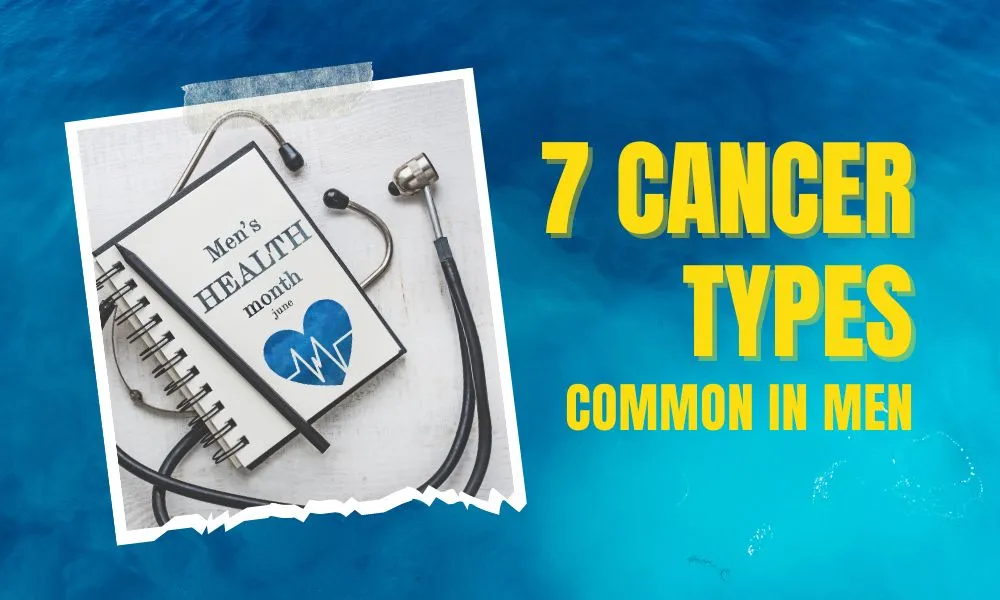The month of June is celebrated as Men’s health month. It is dedicated to raising awareness about common health issues in men and the importance of having a good lifestyle to prevent diseases. It is essential to know what diseases can pose a threat to men’s health, and accordingly, one should take preventive measures to minimize the risk of such health issues.
Health complications like diabetes, heart-related disease, and hypertension are common and lifestyle oriented. However, a few cancer types are more common in men. Knowing their symptoms or risk factor can be helpful.
Here are seven cancer types that are common in Men.
-
Prostate Cancer
This is the most common cancer in men, and its chances increase as men age. Most prostate cancers are detected in men post 60 years. Prostate cancer is a type of cancer that develops in the prostate gland, which is only found in males. It is small and walnut-shaped, and its main function is to generate fluid that is part of the semen.
Some warning signs of prostate cancer are difficulty urinating, frequent need to urinate, pain while urination, and pain in the pelvis, back, or hips.
Preventive Measures:
Although there is no proven way to completely prevent prostate cancer, you may be able to lower the risk by following measures:
-
Get regular prostate screenings based on your risk factors.
-
Maintain a healthy weight and exercise regularly.
-
Eat a nutritious diet.
-
Avoid tobacco products.
-
Ensuring Vitamin D intake is sufficient.
-
Being physically and sexually active can enhance prostate health while ageing.
-
Colon Cancer
This is the fourth most common cancer in men. It is curable if detected early. Colon (colorectal) cancer is a condition that results in the growth of cancer cells in the large intestine area. Although it affects older adults, it can happen at any age, leading to several complications.
Early warning signs of colon cancer can be changes in bowel movement, anaemia, frequent bloating, abdominal and pelvic pain, weakness, weight loss, and loss of appetite.
Preventive Measures:
Avoiding processed meats, smoking, limiting consumption of red meat and alcohol, regular exercise, and controlling weight, keeping track of family history of colon cancer and undertaking regular cancer screening in case of abnormality are few ways to reduce the risk of colon cancer.
-
Testicular Cancer
This is a common cancer in men. It starts when there is growth of malignant cells in the testicles. The testicles are in the scrotum, a loose bag of skin underneath the penis. The testicles are where the sperms and testosterone are produced. It can happen at any age between the age group of 15 and 35 years.
Most prominent sign of testicular cancer often is a bump or lump on one or both testicles. Other symptoms may include lower back pain, feeling heaviness in the scrotum or sudden swelling in the scrotum, dull ache in the lower belly or groin, pain or discomfort in the testicles or scrotum, and tenderness in breast tissues.
Preventive Measures:
There is no prevention against testicular cancer. However, a regular examination of testicles can help in early detection. Many doctors recommend performing a testicular self-examination monthly. It takes as little as two minutes. If you notice a change in the size of your testicles or feel a lump, contact your doctor. One should be alarmed in case of family history, and undertake regular screenings. Testicular cancer that’s diagnosed and treated early has an excellent cure rate.
-
Penile Cancer
This cancer arises when there is a cancerous growth in the penis (reproductive organ in men). The cancer can form anywhere in and around the penis. Penile cancer risk is higher in age group above 45 years.
The early symptoms of this cancer are change in skin colour near penis, swelling and irritation near the head of penis, foul smelling fluid underneath the foreskin, small crusty bumps, or rash around the penis.
Preventive Measures:
Penile cancer risk can be minimised by quitting smoking, having safe sex, getting vaccinated for human papillomavirus (HPV) as some strains can cause penile cancer. Practising good hygiene is an important part of having a healthy penis. And most important of all is regular self-examination to check for any abnormality.
-
Lung Cancer
Men are more vulnerable than females to lung cancer. Lung cancer arises when cancerous cells inside the lung start growing uncontrollably. Lung cancer commonly occurs in individuals between 45 and 75 years of age. The risk of this cancer is significantly higher in people who smoke or have started smoking or consuming tobacco at an early age.
Constant coughing, blood in the cough, chest, spinal, or shoulder pain that gets worse while laughing, coughing, or taking deep breaths, sudden weight loss, tiredness, loss of appetite, change in voice, and wheezing are a few early symptoms of lung cancer.
Preventive Measures:
The most vital measure to prevent lung cancer is not smoking or consuming tobacco. In addition to this, one should avoid exposure to chemical substances and harmful gases. Having a healthy exercise regime and eating a balanced diet can prevent the risk of lung cancer.
-
Bladder Cancer
Men are four times more prone than women to be diagnosed with bladder cancer. It begins in the cells of the bladder. The bladder is a muscular organ that stores urine and is in the lower abdomen.
Early symptoms of bladder cancer are back pain, frequent and painful urination, and blood in urine, which may cause urine to appear bright red.
Preventive Measures:
There is no guaranteed way of preventing bladder cancer. But the risk of this cancer can be prevented by avoiding smoking, eating loads of fruits and vegetables, and drinking sufficient water and fluids.
-
Male Breast Cancer
Yes, breast cancer can occur in men as well. When there is a cancerous growth in the breast tissue of the chest, breast cancer is diagnosed. This is a rare type of cancer in men as compared to women. However, the possibility of breast cancer in men cannot be ruled out completely.
Few symptoms of breast cancer in men are a painless lump in and around the nipples or arm, red or scaly skin on chest or near nipple, any discharge from the nipple and pain or tenderness in the chest.
Preventive Measures:
There are no set rules for preventing breast cancer, although a regular self-examination for any lump or irregularity in and around the skin of the chest can help in early detection.
Cancer cannot be 100% preventive. However, one can minimize cancer risk with a healthy lifestyle, good eating habits, an active exercise regime and regular screenings.
Battling cancer becomes easy when a cancer patient has someone to talk to and share. We invite cancer patients, survivors, and their relatives to join our vibrant Onco Conquerors Cancer Care community on Facebook. Let us unite and make this journey great for each other.





